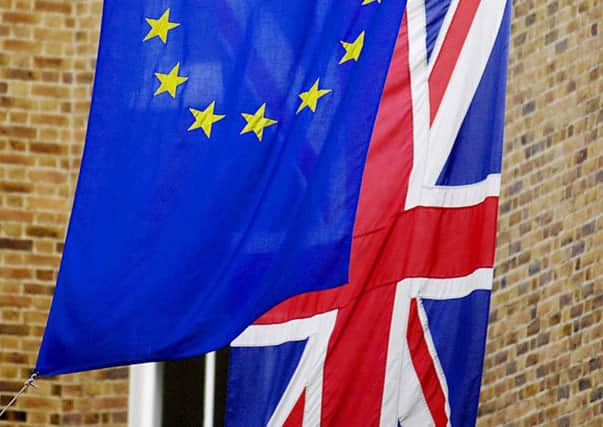Andrew Wilson: SNP and I split on EU referendum


A tiny minority of our current citizens voted in the last referendum in 1975, and the Europe project has changed in very fundamental ways since then. Like all institutions in modern life it needs to reform to survive and it must re-win its legitimacy.
Democracies everywhere should constantly question whether the way they are set up is fit for modern purpose. Challenging the function and role of the state at all levels is healthy. Once in a generation, fundamental questions can also be asked and answered, while all of the time reforms and improvements can be made. This needn’t replace debate about all the other things that government can or should be doing; it should enhance it.
Advertisement
Hide AdAdvertisement
Hide AdThere is no doubt when major moments of choice arrive that the uncertainty about the outcome can negatively affect major investment choices and add another risk to the registers of businesses. But over it they will get, in the end.
At least they will if the Yes campaign wins. And I am much less sure of that victory than others seem to be.
The percentage of voters supporting the Yes to Scottish independence challenge to the status quo started in the late 20s or early 30s, and ended on 45 per cent. The polling for getting out of Europe is already at around 45 per cent, with the don’t knows excluded. A swing far smaller than the independence campaign achieved would see a UK exit.
The greatest risk is that the campaign for staying in adopts the sort of aggressively negative, top-down tone and strategy that the No campaign did in Scotland’s vote.
In a speech to the European Policy Centre in Brussels last week, First Minister Nicola Sturgeon flagged up two material dangers in the UK government’s current approach.
The first is that the negotiations risk becoming a battle with foreign bureaucrats when they should be adult and constructive and about making Europe better. We are in dialogue with partner countries. “We shouldn’t cast negotiations in terms of there being ‘winners’ and ‘losers’. The whole point about a more effective European Union is that everyone should gain from it. Compromise isn’t always the same as concession,” Sturgeon argued, and she is correct.
Her second point was about the grave danger there is in a wholly negative frame that has dominated Westminster discourse on Europe for decades: “UK government rhetoric creates the impression that EU membership isn’t beneficial at present – it will only become beneficial if we achieve big enough reforms. That approach makes it harder to articulate the benefits we gain from membership. There’s a danger the UK will focus the debate on the size of the reforms achieved, rather than the bigger picture of the value and importance of the EU.”
Not for the first time, Sturgeon has encapsulated the core of the issue perfectly. Both points and her general appeal as a modern political leader, in a world of the opposite, make her a potentially clinching asset for the whole UK campaign when it comes.
Advertisement
Hide AdAdvertisement
Hide AdShe looks and sounds different from the Westminster establishment, and the content of her case is always considered, thoughtful and principled. As her speech this week showed, her contribution will not only add a strong voice but she will add a strategic insight that could be decisive.
To those willing to listen through the negative wall of noise still being thrown at the SNP by opponents and the media in London, the reality of its voice can be discerned.
Angus Robertson’s first stint in his new position at Prime Minister’s Questions struck precisely the correct tone on a topic – the Mediterranean migrant crisis – that needed to be heard. He followed numerous maiden speeches in the past week or so from new SNP members who warrant watching if you have the time.
The gulf between the reality of their approach and the critique being thrown at them is stark. And in the modern world, truth will always out.
Europe could be the decisive debate that finally pulls the scales from the eyes elsewhere in the UK on what the phenomenon of the modern SNP is all about. And in the meantime, on a host of other topics, a constructive, considered, different analysis on everything from austerity to immigration and defence can only be good for every citizen of the UK.
Sturgeon is also right that a UK “out” vote at the same time as a Scottish “in” majority could precipitate a dramatic shift in opinion in Scotland behind independence, and the case for an early second referendum.
Ironic indeed then, that her own campaign in the referendum could be the secret weapon that secures the Yes to Europe across the UK. «